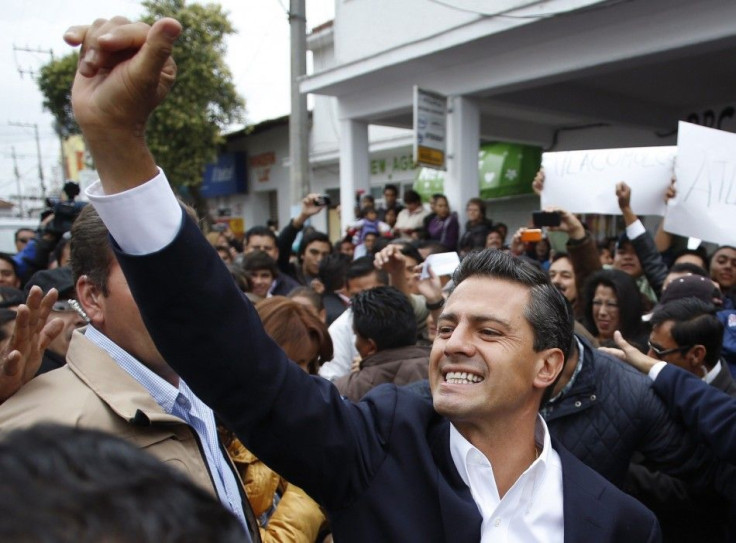Mexico's New President Peña Nieto Must Overcome Party Reputation

The official results have yet to be announced, but by most measures Enrique Peña Nieto won Sunday's presidential election in Mexico, taking 37 percent of the vote. Peña Nieto of the Institutional Revolutionary Party, or PRI, will take over from Felipe Calderon, who was constitutionally barred from running for a second six-year term.
We all won in this election. Mexico won, Peña Nieto declared at party headquarters after polls closed on Sunday. This is just the start of the work we have before us.
One of the major issues of this campaign was the drug war at the heart of Calderon's presidency. During Calderon's six years in office, some 50,000 people were killed as the nation's powerful cartels did battle with the military and state police. The success of Calderon's program, which resulted in the arrest of many gang bosses, is still up for debate, but, in general, Mexicans are fed up with the violence and death that has overtaken the nation and headlines.
All of the presidential candidates promised a policy shift that would favor reducing homicides over elevating the arrest rates. Peña Nieto has already recruited legendary Colombian General Oscar Naranjo, part of the government that stopped cartel boss Pablo Escobar, to help create a new federal police force that will take the army's place in the drug war.
But the PRI has a historically controversial relationship with the drug trade. The party, which ruled Mexico from 1929 to 2000, has a reputation for corruption. Making deals with drug traffickers was standard practice among officials, and Envio magazine wrote on the eve of the 2000 election that if the PRI were given another term, Mexico would be on the verge of becoming a 'narcostate' due to the intricate links between organized crime and the state apparatus.
During his campaign, Peña Nieto insisted that he represents a new generation of the party, but recently a number of exposés on Mexico's drug trade -- published in the New Yorker, New York Times magazine and elsewhere -- have raised concern that the president-elect's stated decision not to focus on stopping drug shipments or capturing kingpins could allow people like the Sinaloa Cartel's Joaquin El Chapo Guzman, one of the world's most powerful people, according to the list compiled by Forbes magazine, to operate with impunity.
Many, including U.S. Republican congressman Jim Sensenbrenner, believe that Mexico can either have peace or stop cartels, but not both.
Under Calderon, Mexico received a significant amount of military and financial help from the drug cartels' biggest customer, the United States. The Drug Enforcement Agency has been happy to provide assistance to Mexican, as well as Honduran and Colombian, militaries as narco-trafficking increasingly became an international endeavor.
Peña Nieto told the New York Times in June that he wants to continue to work with the U.S. but added that Mexico will not subordinate to the strategies of other countries. But despite his campaign soundbites, U.S. officials don't believe that Peña Nieto will suspend the 2007 Merida Initiative, which has brought Mexico American-made helicopters, speedboats and armored vehicles alongside police training, border investment and community development, according to the Council on Foreign Relations' Shannon K. O'Neil.
Additionally, the U.S. and Mexico are massive trading partners, and manufacturing contracts and trade with its northern neighbor have propelled growth among Mexico's middle class, as well as slowed immigration between the two nations to a net zero. To keep this relationship intact, Peña Nieto will want to keep cooperating with the U.S.
I don't see the substance of the relation changing substantially, said Shannon O'Neil of the Council on Foreign Relations, late last month about the Mexico-U.S. relationship. They [Mexico] see the benefits of U.S. cooperation and assistance and intelligence that the Calderon administration has cultivated and developed ... [but] there's going to be new people on both sides, so there's going to be a time to sort of reform the trust and cooperation.
Domestically, Peña Nieto also plans on making economic and industrial reforms, including giving private and foreign companies access to the state-owned oil industry. While the success of the reforms will depend largely on how many seats the PRI wins in congress and whether Peña Nieto can bring Mexico's powerful labor unions on board with his program, according to Reuters, Mexico has been without major reforms for nearly 30 years, and many sectors are stalled.
A Mexican economy that enters a spiral of growth will create a greater capacity to bring back Mexicans living here [in the U.S. to Mexico] and to stop Mexicans living in Mexico from leaving -- and that would take pressure off of one of the most conflictive topics in the Mexico-U.S. relationship, Carlos Elizondo, a top Mexican economist and former ambassador to the Organisation for Economic Co-operation and Development, told Rolling Stone.
Nonetheless, the fear that Pea Nieto will turn back the clock to the days of the old PRI is real. But alternation in power is healthy for Mexico, according to Jorge Heine, a professor of global governance at the Balsillie School of International Affairs at Wilfrid Laurier University. Mexico needs a fresh impetus, and Peña Nieto will have his work cut out for him.
© Copyright IBTimes 2024. All rights reserved.





















